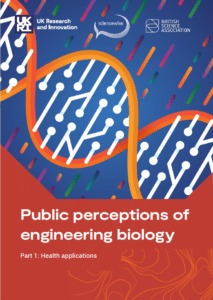In early 2023, engineering biology was identified by the UK Government as one of five critical technologies. This means that engineering biology has been prioritised as one of the areas where the UK can develop a global competitive advantage and establish governance leadership in regulation, standards, and responsible innovation.
Engineering biology is the application of engineering principles to biological systems. As the natural successor to biotechnology, engineering biology enables the development of new or enhanced biological entities and products, like cells or proteins. It offers innovative solutions across the economy, and by being a low carbon technology, it presents opportunities to solve societal challenges faced in food, health, energy, materials and chemicals.
Despite the Government, industry, and researchers’ interest in the discipline, recent evidence on public attitudes to engineering biology in the UK is relatively scarce. This report outlines what is known about public views and values on engineering biology and identifies key themes which could be further explored through public dialogue.
Public perceptions of engineering biology
Sciencewise has published a new report — authored by the British Science Association (BSA). The report Public perceptions of engineering biology explores the public’s views on engineering biology. This is the first of two reports on the topic. The first focuses on health applications and the second will explore engineering biology in food. The report reviews research on the public view of engineering biology from across the world published since 2017.
We found five key findings, which we have outlined in the report:
1. There is a lack of recent UK engagement on engineering biology. Many sources included in this report are from international studies, and cannot be assumed to be transferable to a UK context.
2. Attitudes to engineering biology are likely to be dependent on the context and peoples’ values, including their levels of trust in science.
3. People are likely to be optimistic about using engineering biology to solve societal challenges, especially when they have a higher level of awareness about engineering biology.
4. People are likely to be concerned about safety, inequitable access (particularly in health applications), misuse, and blurring the boundary between natural and artificial.
5. Policy leaders may have a perception of negative public attitudes to engineering biology because of previous anti-GM (genetic modification) sentiment.
You can find the full report here: Public perceptions of engineering biology – part one: health applications.






